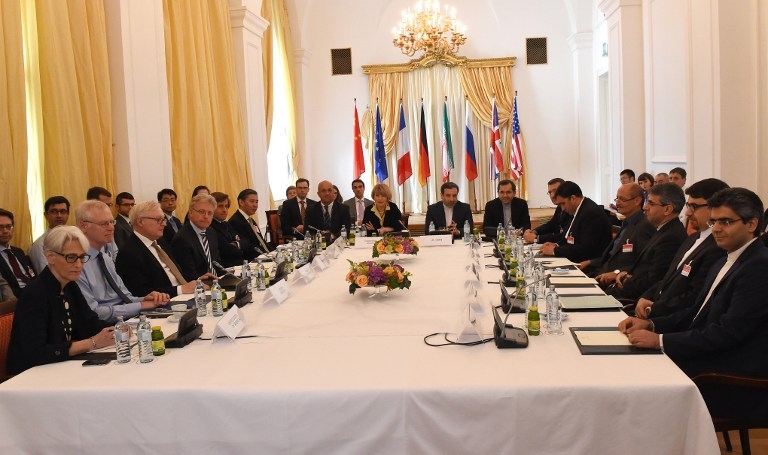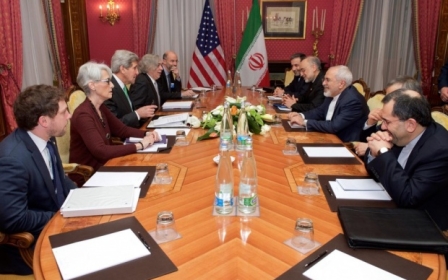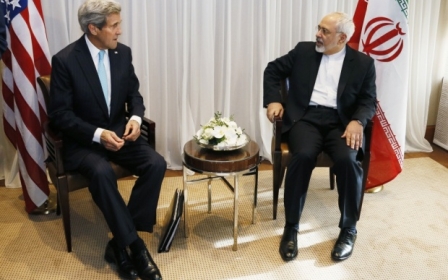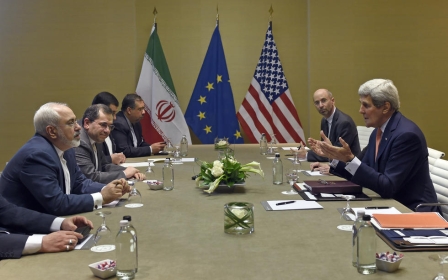Rouhani prepares Iranians for delay in sanctions lifting

Iran's president warned on Saturday that haggling by world powers could jeopardise the 30 June deadline for a nuclear agreement, admitting many differences remain on the details of the potentially historic deal.
Hassan Rouhani, who has placed his credibility on ending more than a decade of international concern that the Islamic republic is developing a nuclear bomb, also acknowledged sanctions would not be lifted immediately under the accord.
"It might be one month," Rouhani told a press conference held on the second anniversary of his election. He rebuffed the suggestion from a journalist that it could take a year for the sanctions to end, the New York Times reported.
Officials at Iran's Central Bank told MEE last month that the country's economy could grow by 2 percent if there is a nuclear agreement and sanctions are lifted.
Rouhani's remarks in Tehran come a day after Russia's senior negotiator spoke of a "very worrying" slowdown in painstaking diplomacy which has lasted 21 months.
With the finishing line in sight, Rouhani, accused the other side of agreeing terms in one meeting only to try and improve on them during later discussions.
"They start to haggle," he said, without naming any of the six global powers in the talks.
"If the other party respects the agreed framework and does not add other demands, the differences can be resolved, but if they choose the path of haggling, then it can prolong the negotiations," he added.
Iran and the P5+1 group (Britain, China, France, Russia and the United States plus Germany) agreed the outlines of the nuclear deal on 2 April after intensive talks went past a 31 March deadline.
In Washington on Friday, State Department spokesman Jeffrey Rathke admitted the process was proving "complicated", but the US believes a deal can still be reached by the end of June.
A day earlier French Foreign Minister Laurent Fabius - seen as a hawk in the negotiations - said tighter UN inspections of Iran's nuclear facilities, under an additional protocol, were not yet sewn up.
Iranian officials have insisted there can be no inspections of military sites and Rouhani appeared to muddy the waters further.
"Iran will not allow its secrets to be disclosed or put in the hands of others," he said, noting there can be "some access" but did not detail which sites he was referring to.
"We have secrets in technology. Our secrets will be protected," he added.
With deputy foreign ministers and technical experts currently meeting in Vienna in the run-up to the final talks, Russia's senior negotiator spoke on Friday of slow progress.
'Months' to lift sanctions
"There is very little time before the deadline and we urgently need to enter the final stage," said Sergei Ryabkov, a deputy foreign minister.
Alluding to those concerns, Rouhani said despite "many differences" under the deal, which aims to guarantee that Iran's nuclear activities are peaceful, he remained "hopeful" of an agreement.
The proposed accord would mothball large parts of Tehran's atomic programme in exchange for a lifting of extensive sanctions that have severely damaged its economy.
But the process of implementing each side's obligations under a complex agreement lasting at least a decade remains unsettled.
Iranian lawmakers and hardliners maintain that sanctions must be lifted when the deal is signed, despite most experts agreeing it will take significant time to do so.
"We are currently discussing it," Rouhani said, when asked about the timing of sanctions being removed, conceding that "weeks or even months will pass" between signing and implementing the deal.
A UN Security Council resolution to cancel previous resolutions on nuclear matters "will be the first major step and a guarantee" he said.
"Then it will take several months to implement all the commitments," he added referring to sanctions imposed by the EU and the US.
Those sanctions, implemented in 2012, targeted Iran's oil and financial sectors and plunged the country into a deep economic crisis which led to inflation above 40 percent.
Rouhani said the talks were "so far a great victory for the Iranian nation", insisting that the major powers have recognised Iran's right to possess a uranium enrichment programme.
But he also hit out at those in Iran who sought to downplay the effect of sanctions, saying they had halted foreign investment.
"OK, the country can survive... but if we want to compete in the world we need them removed," he said. "No big country can thrive behind closed doors."
New MEE newsletter: Jerusalem Dispatch
Sign up to get the latest insights and analysis on Israel-Palestine, alongside Turkey Unpacked and other MEE newsletters
Middle East Eye delivers independent and unrivalled coverage and analysis of the Middle East, North Africa and beyond. To learn more about republishing this content and the associated fees, please fill out this form. More about MEE can be found here.




